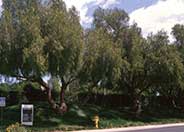
Common name:Strawberry Madrone
Botanical name:Arbutus 'Marina'
The 'Marina' has gorgeous bark, with leaves that are smaller and not as glossy as Pacific Madrone. Its flowers are pink, borne in pendant clusters in the summer. The fruit is large, red and quite ornamental. The plant should be grown in sun to part shade, with little or no summer watering when established. The 'Marina' prefers good drainage. -Monterey Bay Nursery

Common name:California Pepper, Mission Pepper
Botanical name:Schinus molle
The California Pepper is a fast growing evergreen tree that will mature to a height of 25'-40' and as wide. Its bright green leaves are divided into many narrow, 1.5"-2" long leaflets.

Common name:Leather Leaf Sedge
Botanical name:Carex buchananii
This orange bronze ornamental grass/reed is 2'-3' tall and 1'-2' wide and does best in full sun to part shade.

Common name:Sea Lavender, Statice
Botanical name:Limonium perezii
This mounding shrub will reach about 3' high and has large, dark green leaves with small blue and purple flowers that bloom in spring and summer.

Common name:Yellow Moraea, Fortnight Lily
Botanical name:Dietes bicolor
This clumping perennial Iris relative stands 3'-4' high. It has light yellow, iris-like flowers with maroon blotches that are about 2" wide. It performs best in full sun and in soil with good drainage.

Common name:Flowering Maple
Botanical name:Abutilon hybrids
Flowering Maple usually grow to 8'-10' tall and as wide. Most will tolerate frost to 25 degrees F or lower with some damage. All are irresistible to hummingbirds with their showy flowers and heavy nectar production. They will take sun to moderately deep shade and little or no summer watering in coastal areas. They should be given more shade and water in hotter, drier climates. They make an excellent plant for containers. -Monterey Bay Nursery
Sustainable Fertilization
If you mulch heavily as recommended in the compost and mulch fact sheets you should not need traditional fertilization. Sustainable landscapes fertilize themselves as soil organisms break down and recycle the dropped leaves into nutrients.
Click in the green box for more information
| Designer: | Sunbathing in the Patio |
Photographer: GardenSoft |
Soils and Compost:
Physical weed control, including mulching, or hand removal protects the watershed from harmful chemicals.
Water Saving Tip:
Be sure to fix all leaks promptly no matter how small they may seem.
Integrated Pest Management:
Attract, or buy beneficial insects such as ladybugs and lacewings to control pest outbreaks in your garden.

